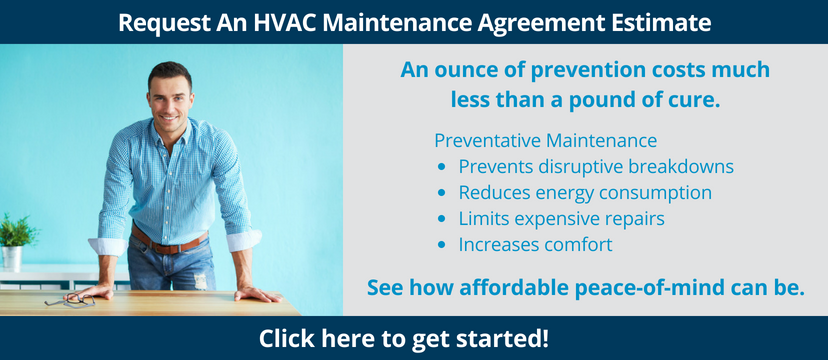You probably already knew that your heating and air conditioning equipment has air filters that need to be changed. But did you know that the type of filter you choose can mean the difference between sniffling your way through allergy season and breathing easy? It’s time you learned about MERV filter ratings.
The common misconception about HVAC air filters
Many people assume that any heating and air conditioning filter will rid the air of contaminants. Wrong! Those ordinary air filters do no more than keep dust and debris out of your heating and air conditioning equipment. They do not protect your lungs and your sinuses by removing pollen and mold.
To remove outdoor allergens from your building’s air handling equipment and the air you breathe, you need high-energy particulate air filters, more commonly known as HEPA filters.
Made from layers of glass fibers formed into pleated paper-like material, HEPA filters trap more than 99 percent of pollen, dust and smoke. HVAC HEPA filters are rated according to the minimum efficiency reporting value (MERV) system, which is based on how well the filter blocks particles of different sizes. MERV filter ratings range from MERV 1 to MERV 20, with a higher rating being better for removing tiny particles like many species of pollen.
Ask your NYC HVAC service provider to install HEPA filters with MERV filter ratings of 16 or above, which are most effective at blocking the particles that cause allergies. Ordinary filter have much larger holes, so they are not capable of trapping viruses and pollen.
ONE CAVEAT to be aware of: some HVAC systems can’t accommodate higher filtration either because of space issues (the filters won’t fit in the housing) or because the reduced airflow causes pressure drops that can decrease system performance. Always consult with a HVAC professional before purchasing HEPA filters for your equipment.
Choosing HVAC filters with low MERV filter ratings can affect your health
Have you ever taken a look at your used HVAC filters? It’s a pretty disgusting sight, and that’s only the dust and debris that you can actually see. Just imagine all the tiny particles that are sneaking through your ordinary filters with low MERV filter ratings.
Remember that the air you breathe in your space all comes through your HVAC system. When you use air filters with low MERV ratings that are not capable of removing the contaminants from the air, those bacteria, viruses, pollen and mold spores wind up in your equipment, passed into the ductwork, and distributed throughout your occupied space.
This is especially troubling, and even dangerous, for people with allergies, asthma, and other breathing difficulties. In the worst case, you could face Sick Building Syndrome, when large numbers of building occupants report unexplained illnesses.
Ask your NYC HVAC service provider about HEPA filters to minimize pollen and other allergens.
Related Article: Could Your New York HVAC System Be Making You Sick?
Don’t forget to change the filters frequently during allergy season
For HEPA filters to be effective, they need to be changed at least every other month, or sometimes more often if your building is located in an area with very high pollen counts.
Other ways you can tweak your HVAC system to improve your air quality and your allergies
According to the Occupational Safety and Health Administration (OSHA), one of the most common causes of poor indoor air quality is poor upkeep of ventilation, heating and air conditioning systems.
When you first start up your air conditioning system at the start of the season and again when you shut it down in the fall, bring in an HVAC service specialist to do AC preventative maintenance. This service typically includes a detailed inspection and tune up of your system.
Dirty cooling coils, fan motors and blades, drain pans and other parts can cause contaminants and moisture to enter the ducts and accumulate. Moisture is especially dangerous as it can lead to mold growth. As your air handling systems circulate air throughout your building, they are also circulating contaminants including pollen and mold spores.
Regular maintenance of your equipment and even cleaning of your air ducts by experienced professionals can greatly improve the air quality in your building and help reduce allergy symptoms.
BONUS: Cleaning and tuning up your HVAC system also prevents breakdowns and increases the life span of your system. Not to mention improving the efficiency of your equipment, saving energy and reducing your utility bills.
Related Article: Spring AC Maintenance Checklist & Comparing Service Contracts.
If you’re in the NYC metro area, contact Arista about a maintenance agreement for your system.
Fight the onslaught of pollen with a HEPA filter that has a high MERV filter rating
Having your air filter changed is as easy as making a call to your trusty NYC HVAC service provider. He can advise you on exactly the right filter for your equipment, get you good prices on filters with high MERV filter ratings, and even order multiple filters so you can change them yourself in between HVAC tune-up appointments.
Now that you understand the importance to your health of having your HVAC system properly taken care of, you may be unsure that your current HVAC service provider is really up to the job. Find out how to tell and learn how to make the switch to a provider you can trust to do the job right. Grab a copy of our helpful guide to Contract Confidence: Transitioning to a New HVAC Service Provider.

